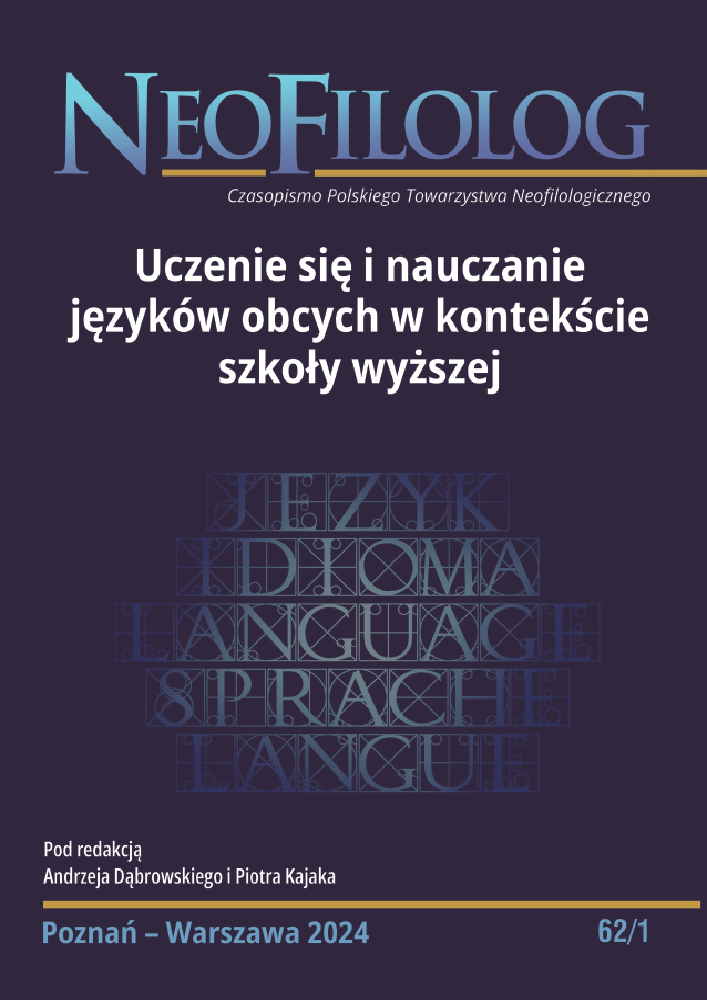Abstract
Russian language acquisition by Polish students is understood as effective and appropriate interaction in various conversational situations. This requires specific habits in the use of the contemporary Russian linguistic system. The use of a language can be examined in a natural communicative situation, which needs informal, spoken language. The usage of English loanwords in spoken Polish and Russian is frequent, which is why the characteristics of spoken language in contemporary spoken Russian and Polish needs to be examined. Research conducted on a group of Polish, Russian, Belorussian and Ukrainian Youtubers shows that their speech contains some specific derivatives which are characteristic of colloquial Russian and Polish. It also contains groups of English loanwords: assimilated nouns, verb and adjective derivatives with productive suffixes. The study shows that English loanword adaptation differs in Polish and Russian, which reveals system differences between two related languages. Comparison of the most productive word formation processes in Russian and Polish can help to overcome language interference and improve the teaching of Russian to Polish students in general.
Literaturhinweise
Council of Europe: Coste D. i in. (2003), Europejski system opisu kształcenia językowego: uczenie się, nauczanie, ocenianie. Warszawa: CODN.
Harczuk Z. (1972), Interferencja języka polskiego w procesie nauczania języka rosyjskiego. Warszawa: Państwowe Zakłady Wydawnictw Szkolnych.
Isačenko A. V. (2003), Grammatičeskij stroj russkogo âzyka v sopostavlenii s slovackim. Moskva-Vena: Âzyki Slavânskoj Kulʹtury.
Kapanadze P. A. (1984), Sovremennoe gorodskoe prostorečie i literaturnyj âzyk, (w:) Zemskaâ E. A., Šmelev D. N. (red.), Gorodskoe prostorečie. Problemy izučeniâ, Moskva: Nauka, s. 5–12.
Karaulov Û.N. (red.) (1997), Russkij âzyk. Ènciklopediâ. Moskva: Drofa.
Karolczuk M. (2006), Grammatičeskaâ interferenciâ v processe obučeniâ russkoj reči polʹskih studentov-filologov. Białystok: Wydawnictwo Uniwersytetu w Białymstoku.
Krucka B. (2002), Polsko-rosyjskie kontrasty w zakresie derywacji rzeczownikowej. „Acta Universitatis Lodziensis. Kształcenie Polonistyczne Cudzoziemców”, nr 12, s. 43–68.
Krucka B. (2005), Błędy derywacyjne studentów rosyjskojęzycznych na tle polsko-rosyjskich kontrastów słowotwórczych. „Acta Universitatis Lodziensis. Kształcenie Polonistyczne Cudzoziemców”, nr 14, s. 57–94.
Majer J. (1981), Lexical Borrowing and a Comparative Approach to Foreign Language Vocabulary. „Zeszyty Naukowe Wyższej Szkoły Pedagogicznej w Bydgoszczy. Studia Filologiczne. Filologia Angielska”, nr 13, s. 167–201.
Markowski A. (red.) (1999), Nowy słownik poprawnej polszczyzny. Warszawa: PWN.
Pösingerová K. (2017), Interferencja i nauczanie języka polskiego. „Z zagadnień metodyki nauczania kultury polskiej kultury oraz języka polskiego jako obcego”, s. 258–262.
Sviridovič M.V. (2010), Lingvodidaktičeskij aspekt zaimstvovanij v prepodavanii RKI nemeckoâzyčnoj auditorii, (w:) „Četvertye čteniâ, posvâŝennye 70-letiû so dnâ roždeniâ professora V.A. Karpova (Minsk, BGU, 19–20 marta 2010 g.), t. 2, s. 139–142. DOI: https://doi.org/10.1080/10486800903466170
Szulc A. (1971), Lingwistyczne podstawy programowania języków obcych. Warszawa: PZWS.
Valgina N. (red.) (2002) Sovremennyj russkij âzyk: Učebnik. Moskva: Logos.
Online: https://pedlib.ru/Books/6/0262/6_0262-242.shtml [DW 04.08.2023].
Warchala J. (2003), Kategoria potoczności w języku. Katowice: Wydawnictwo Uniwersytetu Śląskiego.
Waszakowa K. (2009), Internacjonalizacja polskiej leksyki – stan obecny, prognozy na najbliższą przyszłość, (w:) Koriakowcewa E. (red.), Przejawy internacjonalizacji w językach słowiańskich. Siedlce, s. 11–28.
Woźniewicz W. (1982), Nauczanie rosyjskiej mowy ustnej (rozumienia ze słuchu i mówienia), (w:) Siatkowski S. (red.), Podstawy pedagogiczne nauczania języka rosyjskiego Warszawa: Wydawnictwa Szkolne i Pedagogiczne, s. 221–240.
Wójcik T. (1973), Językoznawcze aspekty metodyki nauczania języka rosyjskiego. Poznań: Wydawnictwo Naukowe UAM.
Źródła YouTube [DW 30.09.2023]
https://www.youtube.com/watch?v=vL-IGvqrR9M
https://www.youtube.com/watch?v=o2zUmSS5wZ8
https://www.youtube.com/watch?v=j-mQin4Cjrw
https://www.youtube.com/watch?v=IhqSlDnYah4
https://www.youtube.com/watch?v=xmoBcmDo708
https://www.youtube.com/watch?v=FckeEZeCVNo
https://www.youtube.com/watch?v=9j9X2DIoPIc
https://www.youtube.com/watch?v=PQ5XcHTSeHo
https://www.youtube.com/watch?v=ur_nCpA-xBE
https://www.youtube.com/watch?v=g0aYy62cA7M
https://www.youtube.com/watch?v=pIuH-59JUic
https://www.youtube.com/watch?v=9hygIFvaojk
https://www.youtube.com/watch?v=NPKyWMMl-m0
https://www.youtube.com/watch?v=cCz4ich-s2M
https://www.youtube.com/watch?v=paogh8uk3nY
https://www.youtube.com/watch?v=zYDMi2w5SDQ
https://www.youtube.com/watch?v=0HSrmz0wkV4
https://www.youtube.com/watch?v=2DC54sSp_1s
https://www.youtube.com/watch?v=rs8zeOship4
https://www.youtube.com/watch?v=vEHy3eDo79s
https://www.youtube.com/watch?v=aEsuPhBuneg
https://www.youtube.com/watch?v=Fv5LjVFzsUo
https://www.youtube.com/watch?v=QP86aVGC63M
https://www.youtube.com/watch?v=EKVLxTT5FQI
https://www.youtube.com/watch?v=Nm9Lz6sVYKQ
https://www.youtube.com/watch?v=yQcV8NgbPkc
https://www.youtube.com/watch?v=E7HD1OHuuS4
https://www.youtube.com/watch?v=XxcbmXU-cWg
https://www.youtube.com/watch?v=oGgjIApgE6s
https://www.youtube.com/watch?v=VkbxfwI4XIE
https://www.youtube.com/watch?v=xBz9zpsBUgk
https://www.youtube.com/watch?v=wodvrFvEegw
Lizenz
Copyright (c) 2024 Joanna Woch

Dieses Werk steht unter der Lizenz Creative Commons Namensnennung - Keine Bearbeitungen 4.0 International.
Autoren:
Die Autoren der zur Veröffentlichung in der Zeitschrift Neofilolog angenommenen Texte sind verpflichtet, den Vertrag über die Erteilung einer kostenlosen Lizenz für die Werke mit der Verpflichtung zur Erteilung einer Sublizenz CC auszufüllen, zu unterzeichnen und an die Adresse der Redaktion zurückzusenden.
Gemäß Vertrag erteilen die Autoren auf die in der Zeitschrift Neofilolog veröffentlichten Texte der Adam-Mickiewicz-Universität in Poznań eine nicht exklusive und kostenlose Lizenz und erlauben die Verwendung der Sublizenz Creative Commons Attribution-NoDerivatives 4.0 International (CC BY-ND 4.0).
Die Autoren behalten das Recht zur weiteren freien Verfügung über das Werk.
Benutzer:
Interessierte Onlinebenutzer dürfen die seit 2017 veröffentlichten Werke unter folgenden Bedingungen nutzen:
- Anerkennung der Urheberschaft - die Verpflichtung, zusammen mit dem verbreiteten Werk Informationen über die Urheberschaft, den Titel, die Quelle (Links zum Originalwerk, DOI) und die Lizenz selbst bereitzustellen;
- ohne Schaffung abgeleiteter Werke - das Werk muss in seiner ursprünglichen Form erhalten bleiben, ohne Zustimmung des Autors dürfen keine Studien, beispielsweise Übersetzungen, verbreitet werden.
Die Urheberrechte aller veröffentlichen Texte sind vorbehalten.
Sonstige:
Die Adam-Mickiewicz-Universität in Poznań behält das Recht auf die Zeitschrift als Gesamtheit (Layout, Grafik, Titel, Umschlagsprojekt, Logo usw.).

